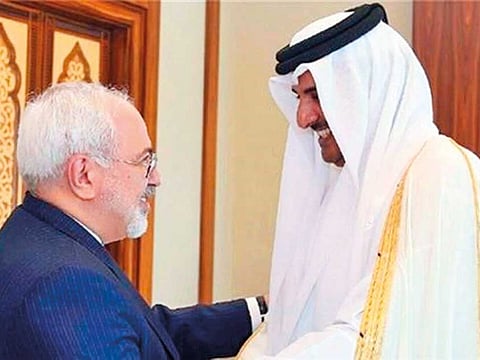Gulf states ‘fed up’ with Qatar’s double standards
When the media serves as a link with terror groups and extremists, we have a grave issue, says one analyst

Dubai: Analysts in Saudi Arabia and other Gulf countries have attributed the strong angry reaction to Qatar’s attitudes recently to the fact they are fed up with its double standards, creepy mirror games and cloak-and-dagger secrecy.
“We have the distinct feeling that Qatar is not sincere in dealing with the other countries in the Gulf and with Arabs in general,” Mohammad Jaber, an analyst, said.
“Whenever we want to move past differences and problems, we are drawn back into a crisis that makes us feel bitter because there is no real reason for it. We do feel angry when we see that Qatar is acting like the agent of Iran in the region that attempts to undermine agreements reached by the Gulf Cooperation Council (GCC) leaders.”
Jaber said that Bahrain, for instance, had to put up with “cascades of lies and allegations from Al Jazeera English against Bahrain under various excuses”.
“We are shocked by the relentless onslaught by some Qatari media or their satellite outlets that use the smallest of incidents to depict a dramatic situation of violence and viciousness in the kingdom.”
Fahd Bin Rasheed, in Saudi Arabia, said that everybody was bewildered by the Qatari behaviour.
“We have been putting up with their eccentric and ominous attitudes for 20 years, and it is about time it ended,” he said.
“When the media serves as a link with terror groups and extremists, we have a grave issue. There is definitely a virus, but we do not know which type. Is it the terror virus, the Muslim Brotherhood virus, the Persian virus? The only solution is to cure it and for good.”
Social media users joined the chorus of anger against Doha’s attitudes and displayed on various online platforms secret conversations recorded in the late 1990s that exposed Qatar’s cloak-and-dagger behaviour and intent to weaken Saudi Arabia in a strategy that sought to combine groundless revenge with far-fetched ambition.
The conversations between Libya’s former leader Muammar Gaddafi, Qatar’s former Emir Shaikh Hamad Bin Khalifa Al Thani and former Prime Minister Shaikh Hamad Bin Jasem Al Thani reveal plans to divide Saudi Arabia into three countries within 13 years.
Hamad Bin Jasem told Gaddafi that Qatar signed an agreement with Donald Rumsfeld, US Secretary of Defence at the time, in order to confront Saudi Arabia.
“The agreement that I signed is for a centre in Qatar for their (American) operations in east Asia and the Middle East. They are in Florida, so they moved some of their staff to Qatar to be close to the area such as Pakistan, Korea or any other regions.
“We agreed to the plan because Saudi Arabia conspired with Egypt and other countries against us and plotted a coup that almost succeeded, but failed because we stood firm. It was a matter of life or death for us. The Americans assisted us and presented an official warning to Saudi Arabia to leave us alone. Saudi Arabia is stronger than we are. Afterwards, we did not feel at ease and felt that we needed a force that would deter them (Saudis).”
The Qatari leaders explained how they went on gaining force in order to deal with their more powerful neighbour.
“We had relations with Israel because whenever there is pressure [by the Saudis] on the Americans, the Israelis are the ones to ease it up, thanks to our relations with them.
“The region is about to witness volcanic changes. A revolution is bound to happen in Saudi Arabia soon, whether we like it or not,” they said.
“The Americans have a strategy and they are thinking that Saudi Arabia must be divided into three small countries.”
To achieve this plan, the Qataris started recruitment parties that could support them.
“We can work on recruiting people from the second ranks by establishing personal relations with them. We will deal with people who tend to travel to Europe. We will work on them softly with the assistance of our embassies,” they said.
On Wednesday, the Saudi daily Okaz wrote: “Rather than trying to repair GCC relations, Qatar’s political deficiency and inferiority complex moved it towards confrontation with the GCC by challenging Saudi Arabia for the title of the leader of the Arab nations.”



